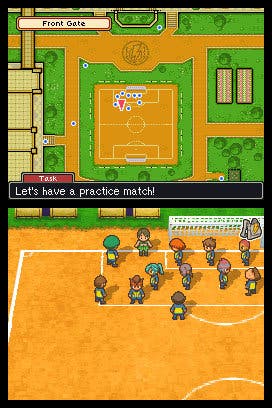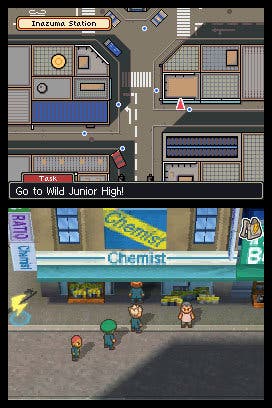Inazuma Eleven
A game of two halves.
There's an unusual stop-and-start rhythm to play. When a defender is close enough to the man in possession, the match pauses while you select the next action. These are rock-paper-scissors decisions on the surface, but underneath is a bubbling mix of stats and elements that works like a simplified version of Pokemon - each player is associated with one of four elements, which is largely irrelevant in the first few hours of games but soon becomes a key focus of your formation choices. Having a fire-based winger against a wood-based full-back basically minimises the element of chance in every challenge and guarantees a steady supply of crosses for your front men, for example.
From one perspective, these challenges are the tensest moments in each match. Waiting to find out if your last man can stop their star striker breaking through is nail biting. But the way the results play out, in animated cut-scenes of varying length, soon proves one of Inazuma Eleven's annoyances. These can, especially in the case of special moves, take a long time to play out, can't be skipped, and the ever-stingy match timer keeps on ticking down.
This combines with the worst aspect of the football: certain story matches have to be completed in a very specific manner, with the worst offender creating a massive difficulty hump a mere two hours into the game. This is against the Occult team, a bunch of black-magic emos who relentlessly cheat - the game guarantees them a goal in the first half, and after a few minutes have been played a cut-scene skips straight to the second half.
1-0 down (or 1-1 if you can score in the first few minutes), the only way to win is to have a shot with a specific player, which is saved but unlocks a special shot you can actually score with - and then, after that, you have to win the game before time runs out.

It's clear why these restrictions are in place - the match has to fit in with the conversations that happen throughout it - but the effect is bizarre, turning a normal match into a nightmare of specific conditions that seems to depend on luck rather than skill. Watching the 'challenge' animations sloooowly play out while the match timer ticks down quickly is as frustrating as Inazuma Eleven gets, and the fact it happens so early on is a terrible misstep.
Later matches have their own conditions, but none is as obtrusive as this - and when Inazuma Eleven just gets on with the game, it's so much better. The way it plays football isn't like any other video game interpretation of the sport, and despite the pyrotechnic specials this at times captures the purity of the beautiful game: last-minute goals, crunching tackles, dodgy refereeing and highly questionable offsides.
The football team is made up of Mark's schoolmates at first, but soon a scouting network is unlocked that lets you hunt out other players. There are around a hundred that can be acquired, though the number present in the game is much higher, and some have the potential to learn unique special moves - a very big deal - while all can be moulded in the way you see fit, through in-world training spots that boost particular stats to moves that can be learned by any player.
On the special moves for a moment, they're the source of a few beautifully judged cross-game references, the best of which is Andy's first goalkeeping special move: the God Hand. Not only does the name hat-tip Clover's incredible swansong, but the move itself is a straight transposition of Gene's palm strike - the only black mark is that shots will on occasion beat it, which struck me as absurd.

Training up your players into specific roles is overlaid on a more straightforward levelling system, but it doesn't prove necessary to immerse yourself in the minutiae - the starting players can develop into unrecognisable behemoths, and you've got a top-tier keeper and striker pretty much from the start. It strikes you as a missed opportunity in the absence of proper multiplayer - which has subsequently featured in the series - because when your dream team's just for use in the storyline it's not so essential to nurture every stat.
That's Inazuma Eleven writ large: it's a game that bodes well for the future of the series. But that future already exists, much-improved and with features that this first stab is missing. The story, for all its daftness, is a charming one that pulls you in, and this being Level-5 the characters are superbly drawn and animated.
Still, you can't help feeling like a second-class citizen playing Inazuma Eleven. It has been subsequently improved upon, and that's all there is to it. It plays a good game regardless, and there really isn't anything else like it on DS - in the UK, at least. But it's like hearing the scores before Match of the Day: you'll still watch, but knowing how things end up makes it feel like going through the motions.

